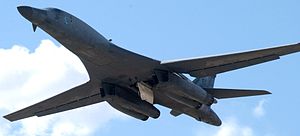Gora Prai airstrike
34°43′N 71°07′E / 34.71°N 71.12°E
| Gora Prai airstrike | |
|---|---|
| Part of the War in Afghanistan (2001–present), Pakistan-United States skirmishes | |
 A B-1 Lancer bomber | |
| Type | Aerial attack |
| Location | |
| Target | Taliban |
| Date | June 10, 2008 |
| Executed by | |
| Casualties | |
The Gora Prai airstrike was an airstrike by the United States that resulted in the deaths of 11 paramilitary troops of the Pakistan Army Frontier Corps and 8 Taliban fighters in Pakistan's tribal areas.[1] The attack took place late on June 10, 2008, during clashes between US coalition forces and militants from the Pakistani Taliban.[2]
The airstrike was in retaliation for an attack on troops about 200 yards (180 m) inside Afghan territory, originating from a wooded area near the Pakistani border checkpoint at Gorparai in Pakistan's Mohmand Agency.[1]
Events[edit]
On June 9, Afghan troops occupied a mountaintop position in a disputed border zone, but began to withdraw the next day following Pakistan's request.[1]
On June 10, Afghan troops, coalition forces and Taliban militants clashed near the border with Pakistan. The Afghan Taliban said it had attacked Afghan troops with 60 to 100 of its fighters when they attempted to set up bunkers and outposts on Pakistani soil. Taliban spokesperson Maulvi Umar claimed to have killed 40 Afghan troops, captured several and shot down a NATO helicopter. He also said eight Taliban troops died in the clash.[1] A U.S. military official stated that coalition forces "were running company- and battalion-sized operations" in Afghanistan's Kunar Province when they were engaged by Taliban forces, who then fled across the border into Pakistan.[3] Two U.S. Air Force F-15E strike fighters and one B-1 bomber entered Pakistani airspace in pursuit of these fighters and dropped about a dozen 500-pound (225 kg) laser-guided munitions on them.[3][4]
The U.S. military says that it informed Pakistan it was engaged in fighting anti-Afghan forces in the area, but Pakistan denied being notified of the air strike and the fighting.[5]
Deaths[edit]
A Pakistani security official said the dead included a major in the Pakistan Army. All were from the Mohmand Rifles, a paramilitary detachment of the Frontier Corps, the force deployed in Pakistan's tribal areas bordering Afghanistan.[4][6]
Reactions[edit]
Pakistan's military released a statement condemning the air strike as "unprovoked and cowardly" and stated that it "had hit at the very basis of co-operation" in the "War on Terror".[7] It also reserved "the right to protect our citizens and soldiers against aggression". Yousaf Raza Gillani, the Prime Minister of Pakistan, told Pakistan's Parliament: "We will take a stand for sovereignty, integrity and self-respect, and we will not allow our soil [to be attacked]."[2]
The United States' Pentagon defended the response to the attack by the Taliban. Press Secretary Geoff Morrell said "In these early hours after this strike every indication we have is that this was a legitimate strike against forces that had attacked members of the coalition". He declined to confirm that Pakistani troops were killed in the attack.[8] US officials asserted that the airstrike was not aimed at Pakistani soldiers and its response was coordinated with Pakistani security officials. Gonzalo Gallegos, a State Department spokesman, said that the United States is "sad to see the loss of life among the Pakistani military, who are our partners in fighting terror."[9]
United States embassy in Islamabad stated that "the United States regrets that actions in Mohmand Agency the night of June 10 resulted in the reported casualties among Pakistani forces, who are our partners in the fight against terrorism. We express our condolences to the families of those who lost their lives."[10]
See also[edit]
References[edit]
- ^ a b c d Pennington, Matthew (June 11, 2008). "Pakistan, US differ over deadly border airstrike". Associated Press.
- ^ a b Waraich, Omar (June 12, 2008). "Pakistan attacks US for 'cowardly' killing of soldiers". The Independent.
- ^ a b Kruzel, John, J. (June 11, 2008). "Air Strike in Pakistan 'Legitimate, Self-Defense,' Pentagon Official Says". American Forces Press Service.
{{cite news}}: CS1 maint: multiple names: authors list (link) - ^ a b Gall, Carlotta; Bowley, Graham (June 11, 2008). "Pakistan condemns airstrike that killed 11 troops in border clash". International Herald Tribune.
- ^ "Pakistan Blames US for Deadly Rocket Attack". National Public Radio. June 11, 2008.
- ^ 2] Stockman, Farah, "Pakistan aid plan facing resistance / $300m requested for paramilitaries", Boston Globe, July 22, 2007, accessed November 7, 2007
- ^ "Pakistani soldiers killed in US missile attack". Belfast Telegraph. Archived from the original on July 29, 2012. Retrieved June 14, 2008.
- ^ Buel, Meredith (June 11, 2008). "Pentagon Defends Deadly Air Strike on Afghan-Pak Border". Voice of America. Archived from the original on June 12, 2008.
- ^ "Airstrike threatens to worsen US-Pak ties". The Daily star. June 13, 2008.
- ^ "Pakistan fury over U.S. 'hot pursuit' attack - CNN.com". edition.cnn.com. Archived from the original on August 3, 2022. Retrieved February 28, 2024.
